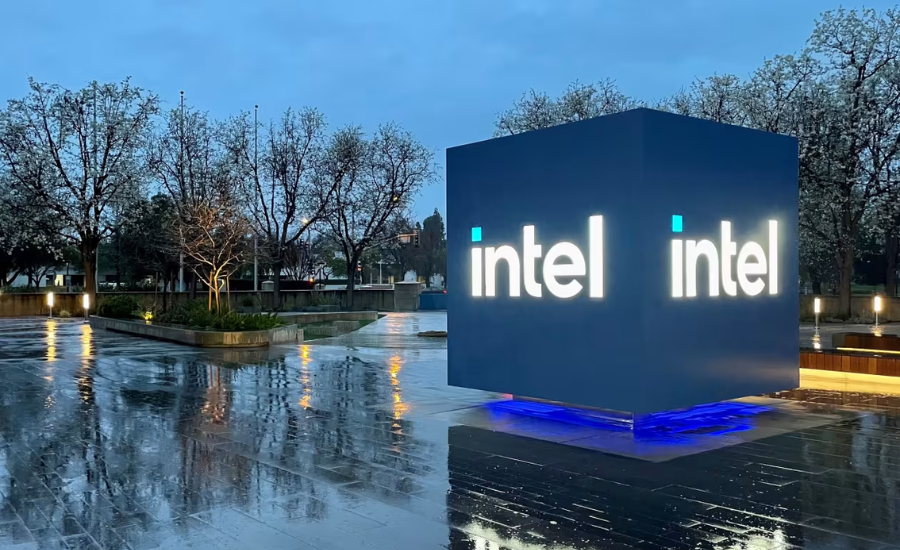Founded in 1968 by visionaries Gordon Moore and Robert Noyce, Intel Corporation has become a global leader in the semiconductor industry. Renowned for its groundbreaking innovations in microprocessor technology, Intel has played a pivotal role in shaping modern computing and communications. Over the decades, the company has maintained a significant influence in the tech industry, making its stock a sought-after asset for both individual and institutional investors.
Intel’s Market Position & Financial Performance

Intel Corporation has established itself as a dominant force in the semiconductor sector, with its processors powering the majority of personal computers, data centers, and enterprise solutions worldwide. Despite facing intense competition from rivals like AMD and NVIDIA, Intel has consistently pushed the boundaries of technology, committing substantial resources to research and development to maintain its competitive edge.
Financial Performance Highlights:
- Revenue Growth: Intel has demonstrated steady revenue growth over the years, with a compound annual growth rate (CAGR) in the mid-single digits, reflecting its strong market presence and product diversification.
- Profit Margins: The company has consistently maintained robust profit margins, showcasing its ability to control costs while driving significant revenue streams.
- Earnings Per Share (EPS): Intel’s EPS has steadily improved, supported by organic growth initiatives and strategic share buyback programs.
Recent Developments Impacting Intel Stock
Fintechzoom Intel Stock has undergone several transformative changes in recent years, marked by leadership shifts and strategic realignments aimed at restoring its technological leadership and manufacturing prowess. The appointment of Pat Gelsinger as CEO in 2021 signaled a renewed focus on innovation and operational excellence, with the company taking bold steps to strengthen its market position.
Key Developments:
- Manufacturing Expansion: Intel has announced ambitious plans to expand its manufacturing footprint, with new fabrication facilities (fabs) planned in the United States and Europe. These initiatives are part of Intel’s strategy to regain its leadership in semiconductor manufacturing.
- Acquisitions and Strategic Partnerships: To bolster its position in emerging technology domains such as artificial intelligence (AI), edge computing, and autonomous systems, Intel has pursued strategic acquisitions and formed key partnerships.
- Competitive Landscape: Despite these strategic moves, Intel faces significant challenges from competitors like AMD, which has made notable inroads into market segments traditionally dominated by Intel.
Intel Stock Performance: Insights From FintechZoom

FintechZoom, a prominent financial news and analysis platform, offers valuable insights into Intel’s stock performance. The platform provides real-time data, technical analysis, and expert opinions, making it an essential resource for investors tracking Intel’s market trajectory.
Stock Performance Highlights:
- Stock Price Volatility: Intel’s stock has experienced notable volatility, influenced by a combination of earnings reports, investor sentiment, and broader industry developments.
- Technical Analysis: FintechZoom’s technical analysis of Intel stock highlights critical support and resistance levels, aiding investors in making informed trading decisions.
- Analyst Ratings: The platform aggregates analyst ratings, providing a comprehensive overview of market sentiment, including whether Intel stock is currently rated as a buy, hold, or sell.
Investment Considerations
Investing in Intel stock requires a thorough evaluation of several factors, including the company’s growth potential, competitive dynamics, and prevailing market conditions. Intel’s strategic focus on advanced manufacturing technologies and its expansion into high-growth areas present promising opportunities for long-term investors.
Key Investment Considerations:
- Dividend Yield: Intel offers a competitive dividend yield, making it an attractive option for investors seeking income-generating assets.
- Growth Potential: The company’s initiatives in AI, 5G, and other high-growth areas provide opportunities for capital appreciation, especially as these technologies become more pervasive.
- Risk Factors: Potential investors should remain mindful of risks such as technological disruptions, competitive pressures, and geopolitical uncertainties that could impact Intel’s business operations and stock performance.
Future Prospects

Given the current market conditions, Intel stock presents a compelling investment opportunity, particularly as the market shows potential for a rebound. Intel’s strategic focus on high-growth areas such as artificial intelligence, autonomous driving, and the Internet of Things (IoT) positions the company for future success. Additionally, Intel is committed to advancing ubiquitous computing, cloud-to-edge infrastructure, and pervasive connectivity, all of which are expected to be key growth drivers in the coming years.
Looking ahead, Intel has outlined ambitious plans for the future, including scaling its manufacturing capabilities from producing 100 billion transistors to a trillion transistors on a single package by 2030. The company also aims to establish a geographically balanced and more resilient supply chain by the end of the decade. These strategic initiatives underscore Intel’s commitment to innovation and growth, which are likely to drive the company’s stock higher over the long term.
Fun Facts About Intel Corporation
- Birth of Moore’s Law: Intel’s co-founder, Gordon Moore, is the namesake of Moore’s Law, which predicted that the number of transistors on a microchip would double approximately every two years. This observation has driven technological advancements for decades.
- Intel Inside: The “Intel Inside” campaign, launched in 1991, became one of the most successful marketing campaigns in tech history, making Intel a household name across the globe.
- First Microprocessor: In 1971, Intel introduced the world’s first microprocessor, the Intel 4004. This innovation revolutionized the computing industry and laid the foundation for modern microprocessors.
- Sustainability Leadership: Intel is a leader in sustainability, with a goal to achieve net positive water use and zero waste to landfills by 2030. The company has been recognized for its commitment to environmental responsibility.
- Diversity in the Workforce: Intel is a pioneer in promoting diversity and inclusion, with initiatives aimed at achieving full representation of underrepresented minorities and women in its U.S. workforce by 2030.
FAQs About Fintechzoom Intel Stock
Q: What is Intel Corporation’s primary business?
A: Intel is a global leader in the semiconductor industry, specializing in designing and manufacturing microprocessors, integrated circuits, and related technologies for computers, data centers, and other electronic devices.
Q: How does Fintechzoom Intel Stock performance compare to its competitors?
A: Intel’s stock has experienced volatility, influenced by competition from companies like AMD and NVIDIA. However, the company’s focus on innovation and expansion into new markets offers potential for future growth.
Q: What are some recent developments at Intel?
A: Intel has announced plans to expand its manufacturing capabilities, including building new fabrication facilities in the U.S. and Europe. The company is also pursuing strategic acquisitions and partnerships to strengthen its position in AI, edge computing, and autonomous systems.
Q: Is Intel a good investment for long-term growth?
A: Intel’s strategic focus on advanced manufacturing technologies and high-growth areas like AI and 5G presents promising opportunities for long-term investors. However, potential investors should consider risks such as competition and technological disruptions.
Q: Does Intel pay dividends?
A: Yes, Intel offers a competitive dividend yield, making it an attractive option for income-focused investors.
Conclusion
Intel Corporation remains a formidable force in the semiconductor industry, with a rich history of innovation and a strong market presence. The company’s commitment to advancing technologies such as artificial intelligence, 5G, and autonomous systems positions it well for future growth. Despite facing challenges from competitors, Intel’s strategic initiatives, including manufacturing expansion and partnerships in emerging tech domains, underscore its determination to lead in the evolving digital landscape. For investors, Intel presents a compelling opportunity, balancing potential risks with promising growth prospects and a reliable dividend yield. Looking ahead, Intel’s ambitious goals, including achieving unprecedented advancements in microprocessor technology and supply chain resilience, signal a bright future for the company and its stakeholders.
Stay in touch for more updates and alerts visit: Latest Dash!

